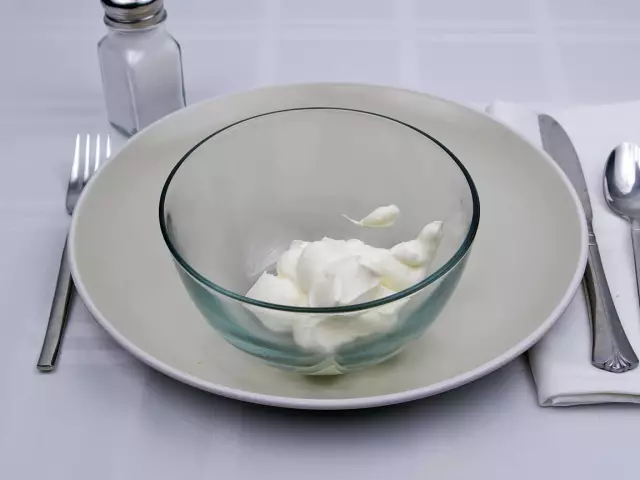- Author Rachel Wainwright wainwright@abchealthonline.com.
- Public 2023-12-15 07:39.
- Last modified 2025-11-02 20:14.
Uniderm
Uniderm: instructions for use and reviews
- 1. Release form and composition
- 2. Pharmacological properties
- 3. Indications for use
- 4. Contraindications
- 5. Method of application and dosage
- 6. Side effects
- 7. Overdose
- 8. Special instructions
- 9. Application during pregnancy and lactation
- 10. Use in childhood
- 11. Drug interactions
- 12. Analogs
- 13. Terms and conditions of storage
- 14. Terms of dispensing from pharmacies
- 15. Reviews
- 16. Price in pharmacies
Latin name: Uniderm
ATX code: D07AC13
Active ingredient: Mometasone (Mometasone)
Producer: JSC "Chemical and Pharmaceutical Plant Akrikhin", Russia
Description and photo update: 2018-22-10

Uniderm is a glucocorticosteroid (GCS), a drug for external use.
Release form and composition
Dosage form - cream for external use 0.1%: almost white or white mass (15 g or 30 g each in an aluminum tube, in a cardboard box 1 tube).
1 g of cream contains:
- active substance: mometasone furoate - 1 mg;
- auxiliary components: cetostearyl alcohol, hexylene glycol, macrogol 20 cetyl stearate, glyceryl monostearate 40-55, diluted phosphoric acid, titanium dioxide, white petrolatum, aluminum starch octenyl succinate, white wax, purified water.
Pharmacological properties
Pharmacodynamics
Uniderm has anti-inflammatory, anti-exudative, antipruritic action.
Mometasone promotes the release of proteins that inhibit phospholipase A2. These proteins, or the so-called lipocortins, delaying the release of arachidonic acid, control the biosynthesis of inflammatory mediators - prostaglandins and leukotrienes.
Pharmacokinetics
Absorption of Uniderma is negligible. After 8 hours after applying the cream to intact skin (without using an occlusive dressing), approximately 0.4% of the active substance can be detected in the systemic circulation.
Indications for use
According to the instructions, Uniderm is indicated for the relief of inflammatory symptoms and itching in dermatoses susceptible to GCS therapy.
Contraindications
- rosacea;
- viral skin infection caused by Varicella zoster, Herpes simplex types 1 and 2;
- infectious skin diseases of bacterial and fungal etiology;
- perioral dermatitis;
- syphilis;
- tuberculosis;
- post-vaccination reactions;
- treatment of large areas of skin and / or long-term use during pregnancy and breastfeeding;
- age up to 6 months;
- hypersensitivity to GCS;
- intolerance to the components of the drug.
Caution should be exercised when prescribing Uniderm for the treatment of the skin of the face and in the area of skin folds, with the use of occlusive dressings, on large areas of damage and / or for a long time (especially in children).
Instructions for use of Uniderma: method and dosage
Uniderm cream is applied externally, applying it in a thin layer to the affected area of the skin.
The procedure is carried out once a day. The duration of the course is determined by the doctor, taking into account the patient's tolerance of the drug, clinical feasibility and the severity of side effects.
Side effects
- allergic reactions: contact dermatitis;
- dermatological reactions: rarely - burning sensation, dryness and irritation of the skin, acne, pruritus, prickly heat, hypertrichosis, perioral dermatitis, hypopigmentation, skin maceration, occurrence of a secondary infection, folliculitis, signs of skin atrophy, striae; very rarely - the formation of pustules and papules;
- others: against the background of long-term therapy and / or applying a cream to large areas of skin lesions, or the use of occlusive dressings - adrenal insufficiency, Cushing's syndrome and other undesirable phenomena characteristic of the systemic use of GCS.
Overdose
Overdose symptoms are: secondary adrenal insufficiency and other dysfunctions of the hypothalamic-pituitary-adrenal system.
It is recommended to carry out symptomatic therapy, if necessary, the electrolyte balance should be corrected. It is recommended to cancel the use of the drug, but if the treatment was prolonged, the cancellation should be carried out gradually.
special instructions
The risk of developing a systemic action of GCS appears when treating extensive surfaces of the body skin for a long time, and increases when a cream is applied under occlusive dressings. Therefore, control over the patient's condition is required for the timely detection of symptoms of suppression of the function of the hypothalamic-pituitary-adrenal system and Cushing's syndrome.
Do not allow the cream to get into the eyes.
Due to the presence of propylene glycol in the preparation, irritation may occur at the site of application. In this case, the use of Uniderm should be discontinued and appropriate therapy prescribed.
The action of GCS can change the symptoms of some skin diseases, this should be taken into account when making a diagnosis.
After long-term treatment with cream, a sudden withdrawal of the drug can cause the development of rebound syndrome (the appearance of dermatitis with intense redness of the skin and a burning sensation). Therefore, the cancellation of Uniderm should be done gradually, using an intermittent treatment regimen.
The process of wound healing against the background of the use of GCS may slow down.
It is recommended to use the cream for pediatric treatment with caution.
Application during pregnancy and lactation
Since GCS overcome the placental barrier, there is a threat of negative effects of Uniderma on fetal development, therefore it is necessary to avoid prolonged use and use of high doses of the drug during gestation.
GCS are excreted in breast milk. It is recommended to stop breastfeeding when treating large areas of skin lesions when prolonged treatment with high doses of mometasone is expected.
Pediatric use
The appointment of Uniderm for children up to six months is contraindicated.
At the age of 0.5-2 years, the duration of the course of treatment should not exceed 5 days.
The safety of topical application and the effectiveness of the cream in the treatment of children over the age of six months for more than 42 days has not been established.
When prescribing the drug to children, it should be borne in mind that they are at high risk of suppression of the function of the hypothalamic-pituitary-adrenal system, and at the same time the development of Cushing's syndrome. This is due to the high surface area to body weight ratio.
Long-term exposure to GCS on the child's body can cause impaired growth and development, therefore, the minimum effective dose should be used for a short period.
Drug interactions
The interaction of Uniderm cream with other medicinal substances / products has not been established.
Analogs
Uniderma's analogues are: Avecort, Gistan-N, Asmaneks, Momat, Nazonex, Momentazon.
Terms and conditions of storage
Store at temperatures up to 15-25 ° C. Keep out of the reach of children.
Shelf life is 2 years.
Terms of dispensing from pharmacies
Dispensed by prescription.
Reviews about Uniderma
Reviews about Uniderma are mostly positive, the effectiveness of the cream is noted in the treatment of skin allergic reactions, relieving inflammation, swelling, itching. The drug is easy to use, good consistency, odorless. The cost of the cream is called acceptable or low.
As disadvantages, it is most often indicated that Uniderm is a hormonal agent.
Price for Uniderm in pharmacies
The price of Uniderm for a tube containing 15 g of cream is approximately 154 rubles, 30 g - 256 rubles.

Anna Kozlova Medical journalist About the author
Education: Rostov State Medical University, specialty "General Medicine".
Information about the drug is generalized, provided for informational purposes only and does not replace the official instructions. Self-medication is hazardous to health!






